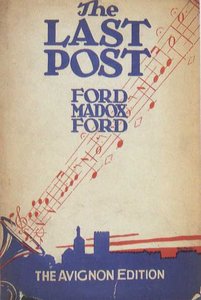
An epistolary novel is a novel written as a series of letters between the fictional characters of a narrative. The term is often extended to cover novels that intersperse documents of other kinds with the letters, most commonly diary entries and newspaper clippings, and sometimes considered to include novels composed of documents even if they do not include letters at all. More recently, epistolaries may include electronic documents such as recordings and radio, blog posts, and e-mails. The word epistolary is derived from Latin from the Greek word epistolē, meaning a letter (see epistle). This type of fiction is also sometimes known by the German term Briefroman or more generally as epistolary fiction.

The Hatfield–McCoy Feud involved two American families of the West Virginia–Kentucky area along the Tug Fork of the Big Sandy River from 1863 to 1891. The Hatfields of West Virginia were led by William Anderson "Devil Anse" Hatfield, while the McCoys of Kentucky were under the leadership of Randolph "Ole Ran'l" McCoy. Those involved in the feud were descended from Joseph Hatfield and William McCoy. The feud has entered the American folklore lexicon as a metonym for any bitterly feuding rival parties.
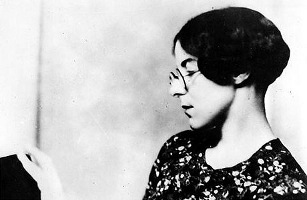
Sylvia Nora Townsend Warner was an English novelist, poet and musicologist, known for works such as Lolly Willowes, The Corner That Held Them, and Kingdoms of Elfin.

At the University of Cambridge in England, a "Wrangler" is a student who gains first-class honours in the Mathematical Tripos competition. The highest-scoring student is the Senior Wrangler, the second highest is the Second Wrangler, and so on. By contrast, the person who achieves the lowest exam marks while still earning a third-class honours degree is known as the wooden spoon.
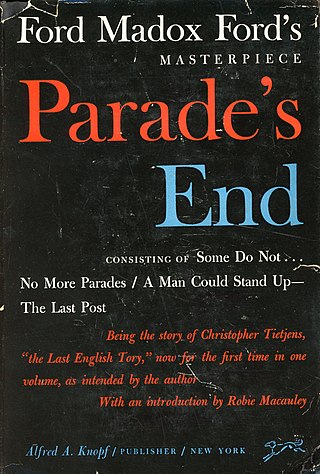
Parade's End is a tetralogy of novels by the British novelist and poet Ford Madox Ford, written from 1924 to 1928. The novels chronicle the life of a member of the English gentry before, during and after World War I. The setting is mainly England and the Western Front of the First World War, in which Ford had served as an officer in the Welch Regiment, a life he vividly depicts. The individual novels are Some Do Not ... (1924), No More Parades (1925), A Man Could Stand Up — (1926) and Last Post (1928).

Chaldon Herring or East Chaldon is a village and civil parish in the English county of Dorset, about 8 miles (13 km) south-east of the county town of Dorchester. It is sited 2 miles (3.2 km) from the coast in the chalk hills of the South Dorset Downs. The highest point in the area is Chaldon Hill about 1.5 miles (2.4 km) to the south, overlooking the sea. In the 2011 census the civil parish had 59 households and a population of 140.

Orley Farm is a novel written in the realist mode by Anthony Trollope (1815–82), and illustrated by the Pre-Raphaelite artist John Everett Millais (1829–96). It was first published in monthly shilling parts by the London publisher Chapman and Hall. Although this novel appeared to have undersold, Orley Farm became Trollope's personal favourite. George Orwell said the book contained "one of the most brilliant descriptions of a lawsuit in English fiction."

Isobel Violet Hunt was a British author and literary hostess. She wrote feminist novels. She founded the Women Writers' Suffrage League in 1908 and participated in the founding of International PEN.
Alyse Gregory was an American-British suffragist and writer.

Groby Castle is situated in the large village of Groby to the north-west of the city of Leicester, England.

Groby Old Hall is partly a 15th-century brick-built manor house and grade II* listed building located very near the site of Groby Castle in the village of Groby in Leicestershire.
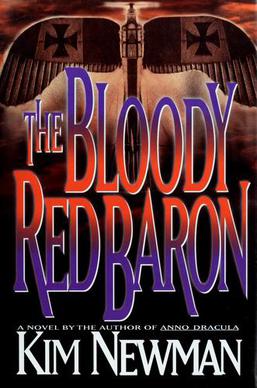
Anno Dracula: The Bloody Red Baron, or simply The Bloody Red Baron, is a 1995 alternate history/horror novel by British author Kim Newman. It is the second book in the Anno Dracula series and takes place during the Great War, 30 years after the first novel.

Thomas James Mison is an English actor, voice artist, and writer. Following his film debut in Venus (2006), Mison had supporting roles in films such as One Day and Salmon Fishing in the Yemen. He is best known for his lead roles as Ichabod Crane on the Fox supernatural drama series Sleepy Hollow (2013–17). and the clones of Mr. Phillips and the Game Warden on the HBO superhero miniseries Watchmen (2019).

Some Do Not ..., the first volume of Ford Madox Ford's highly regarded Parade's End tetralogy, was originally published in April 1924 by Duckworth and Co. The following is a summary of the plot, chapter by chapter.

A Man Could Stand Up — is the third novel of Ford Madox Ford's highly regarded sequence of four novels known collectively as Parade's End. It was first published in 1926.
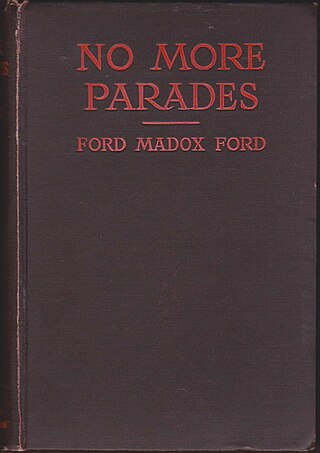
No More Parades is the second novel of Ford Madox Ford's highly regarded tetralogy about the First World War, Parade's End. It was published in 1925, and was extraordinarily well-reviewed.

Parade's End is a five-part BBC/HBO/VRT television serial adapted from the eponymous tetralogy of novels (1924–1928) by Ford Madox Ford. It premiered on BBC Two on 24 August 2012 and on HBO on 26 February 2013. The series was also screened at the 39th Ghent Film Festival on 11 October 2012. The miniseries was directed by Susanna White and written by Tom Stoppard. The cast was led by Benedict Cumberbatch and Rebecca Hall as Christopher and Sylvia Tietjens, along with Adelaide Clemens, Rupert Everett, Miranda Richardson, Anne-Marie Duff, Roger Allam, Janet McTeer, Freddie Fox, Jack Huston, and Steven Robertson.

The Tenants is the sixth novel of Bernard Malamud, published in 1971.

Les Hommes de bonne volonté is an epic roman-fleuve by French writer Jules Romains, published in 27 volumes between 1932 and 1946. It has been classified both as a novel cycle and a novel and, at two million words and 7,892 pages, has been cited as one of the longest novels ever written.
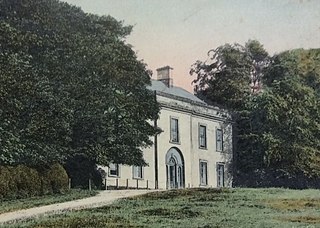
Busby Hall is a Grade II* listed Country House in Little Busby, North Yorkshire, England, close to the village of Carlton-in-Cleveland. The house and parkland sits within the North York Moors National Park.
